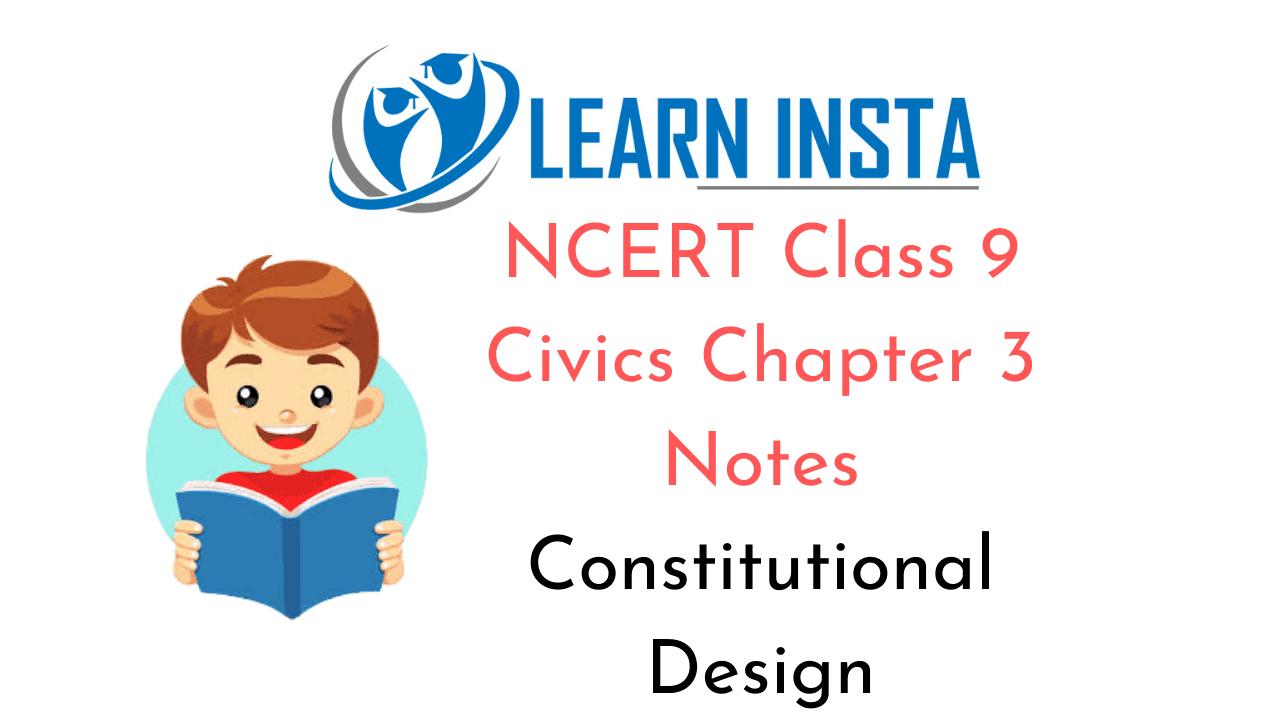
On this page, you will find NCERT Class 9 Civics Chapter 3 Notes Pdf free download. CBSE Class 9 Social Science Notes Civics Chapter 3 SST Constitutional Design will seemingly, help them to revise the important concepts in less time.
Constitutional Design Class 9 Notes Social Science Civics Chapter 3
CBSE Class 9 Civics Chapter 3 Notes Understanding the Lesson
1. In a democracy the rulers are not free to do what they like. There are certain basic rules that the citizens and the government have to follow. All such rules together are called Constitution.
2. Constitution is the supreme law that determines the relationship among people living in a territory and also the relationship between the people and government.
3. All countries that have constitutions are not necessarily democratic. But all countries that are democratic will have constitutions.
4. South Africa attained independence from the apartheid government in 1994 and Nelson Mandela became the first president of the country.
5. A big task was ahead before the party that ruled through oppression and the party that led the freedom struggle to sit together to draw up a common Constitution.
6. After two years of discussion and debate they came out with one of the finest constitutions the world has ever had. This Constitution gave to its citizens the most extensive rights available in any country.
7. The South African Constitution inspires democrats all over the world. The people of the country played an important role in it. They along with the leaders worked together and finally transformed better experiences into the binding glue of a diverse nation.
8. Like South Africa, India’s Constitution was also drawn up under very difficult circumstances. The making of the Constitution for a huge and diverse country like India was not an easy affair. The makers of the Constitution had anxieties about the present and the future of the country.
9. Prominent leaders like Rajendra Prasad and Dr B. R. Ambedkar played an important role in the making of the Constitution. They were inspired by the ideals of French Revolution, the practice of parliamentary democracy in Britain and the Bill of Rights in the US. The socialist revolution in Russia had also its impact on the leaders.
10. The drafting of the document called the Constitution was done by the Constituent Assembly. It had 299 members who wrote the Constitution. The Assembly adopted the Constitution on 26 November, 1949 but it came into effect on 26 January 1950.
11. The Constituent Assembly worked in a systematic, open and consensual manner. First some basic principles were decided and agreed upon. Then a draft of Constitution was prepared for discussion.
12. The Preamble of the Constitution reads like a poem on democracy. It contains the philosophy on which the entire Constitution has been built. It is the soul of the Indian Constitution.
13. Some of the key words used in the Preamble of our Constitution are-sovereign, socialist, secular, democratic, republic, justice, liberty, equality and fraternity.
14. The Constitution of India is a very long and detailed document. Therefore, it needs to be amended quite regularly to keep it updated. The Constitution makers made provisions to incorporate changes from time to time. These changes are called constitutional amendments.
15. The Constitution describes the institutional arrangements in a very legal language. Like any Constitution, the Indian Constitution lays down a procedure for choosing persons to govern the country.
16. It decides who will have how much power to take which decisions. And it puts limits to what the government can do by providing some rights to a citizen that cannot be violated.
Constitutional Design Class 9 CBSE Notes Important Terms
Apartheid: The official policy of racial separation and ill-treatment of blacks followed by the government of South Africa between 1948 and 1989.
Domination: The exercise of power or influence over someone or something, or the state of being so controlled.
Treason: The crime of betraying one’s country, especially by attempting to kill or overthrow the sovereign or government.
Racial discrimination: When a person is treated less favourably than another person in a similar situation because of his/her race, colour, ethnic origin, etc.
Segregation: The action or state of setting someone or something apart from others.
Constitution: Supreme law of a country, containing fundamental rules governing the politics and society in a country.
Preamble: An introductory statement in a Constitution which states the reasons and guiding values of the Constitution.
Citizens: People living in a territory.
Diverse: Showing a great deal of variety.
Universal Adult Franchise: It means all citizens whose age is above 18 have the right to vote.
Constituent Assembly: An assembly of people’s representatives that writes a Constitution for country.
Draft: A preliminary version of a legal document.
Clause: A distinct section of a document.
Philosophy: The most fundamental principles underlying one’s thoughts and actions.
Untouchability: A status of certain social groups (Dalits) confined to menial and despised jobs.
Tryst: A meeting or meeting place that has been agreed upon.
Secular: Not connected with religions or spiritual matters.
Democratic: A form of government where people enjoy equal political rights, elect their rulers and held them accountable.
Republic: A state which has an elected or nominated President rather than a monarch.
Liberty: Absence of unreasonable restrictions on the citizens in what they think, how they wish to express their thoughts, etc.
Fraternity: Friendship and mutual support within a group.